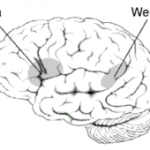LING 101, Fall 2014, Bigham – Syllabus
Course Title: Introduction to Language
Course Number & Section: LING 101, Fall 2014; #21915
Instructor: Assistant Professor DS Bigham (“Professor (Bigham)”)
E-mail: douglas.bigham@mail.sdsu.edu
Office Hours: Mondays 3:30pm-4:45pm in SHW 236; Thursdays 4:00-5:45pm somewhere near the Student Union Starbucks; I’m also available by appointment and any time my office door is open; I am also available online for virtual chat during office hours: http://www.ustream.tv/channel/dsbigham
This syllabus is a work-in-progress and is subject to change. Changes will be noted through the Blackboard announcement system. By enrolling in this class, you assent to the potential variability of the schedule and syllabus.
COURSE DESCRIPTION: The nature of language. Sound, meaning, and grammar. Language history and change. Dialects and variation. Language acquisition. Animal communication. Language and the brain. This course introduces you to linguistics, the scientific, humanistic, and philosophical study of language. You will learn how languages are structured: how sounds become words, how words become sentences, how sentences become statements, questions, compliments, and insults. We will discuss how languages function in society: how a dialect becomes a language, how compliments can become insults, whether or not men and women speak different ‘languages,’ and what your language use says about your ‘personal style.’ We will talk about the biology of language and the practical application of linguistics: how hominids evolved to learn and use language, whether or not animals have ‘language,’ how electronic devices process language, and how computers might eventually learn and use language. Finally, we will investigate major theories of linguistics: how languages change, the diversity of language on Earth, and what linguists still don’t know about language.
This course is one of nine courses that you will take in General Education Foundations. Foundations courses cultivate skills in reading, writing, research, communication, computation, information literacy, and use of technology. They furthermore introduce you to basic concepts, theories and approaches in a variety of disciplines in order to provide the intellectual breadth necessary to help you integrate the more specialized knowledge gathered in your major area of study into a broader world picture.
This course is one of two Foundations courses that you will take in the area of Social and Behavioral Sciences. Upon completing this area of Foundations, you will be able to: 1) explore and recognize basic terms, concepts, and domains of the social and behavioral sciences; 2) comprehend diverse theories and methods of the social and behavioral sciences; 3) identify human behavioral patterns across space and time and discuss their interrelatedness and distinctiveness; 4) enhance your under-standing of the social world through the application of conceptual frameworks from the social and behavioral sciences to first-hand engagement with contemporary issues.
Overview: Linguists study the patterns of language, which carry meaning and articulate social and linguistic identity. Though the details of the patterning vary from language to language and culture to culture, the kinds of patterning are constant. All languages have systems of sounds, units of meaning called words, and larger units called phrases and sentences. All languages have ways of signaling and acknowledging differences of social status and group, and all languages fall into one of a small number of types, which characterize how the different levels of patterning come together, In this course you will learn how linguists analyze language patterns and what kinds of evidence and arguments they use to support those analyses, and you will have the opportunity to explore and defend linguistic analyses of your own.
Linguistics via the Digital Humanities: This course approaches the study of linguistics from a “Digital Humanities” perspective. This means that in addition to learning about linguistics, you’ll also get an introduction to the world of online media, tools, and skills. You will be engaging with topics like website design, social media, data mining, and maintenance of your digital identity. Many of your assignments will require smart internet use and will be submitted via online sites (especially Tumblr, YouTube, and various BBS gateways). Your submissions in reference to this course are part of your permanent academic record and are public; do not submit or link to anything inappropriate.
READINGS & TEXTBOOK:
Language Files (11th Ed.). The Ohio State University Press. ISBN 978-0-8142-5179-9.
Note: You may find other editions of this textbook very cheaply, but homework will be taken from the 11th edition. Perhaps you should get together with some new friends and share a copy… Additional readings and materials will be made available via Blackboard announcements. Keep an eye on Blackboard for these additional materials and links.
PREREQUISITES: None
EXPECTED LEARNING OUTCOMES: In this course, you will begin to…
- Learn how to recognize and describe the basic components of linguistics;
- List and define key terms applicable to linguistics;
- Recognize and understand the organization of the International Phonetic Alphabet;
- Understand how the basic components of linguistics fit together in human languages;
- Examine new problems in linguistics and show how you would solve these problems;
- Analyze real-world settings for the role linguistics and language variation play;
- Become familiarized with the practice of gathering linguistic data from native speakers;
- Acquire a working knowledge of the relationship of linguistics to the Digital Humanities
ASSIGNMENTS/GRADING:
Grading Scale. 100-90 A, 89-80 B, 79-70 C, 69-60 D, 59-0 F
21 Short Quizzes :: 5 pts. (all-or-nothing; graded on completeness, not accuracy)
5 Homeworks :: 25 pts. (5 points each)
5 “Blog Posts” :: 20 pts. (4 points each; 2 additional points for Vlog post)
3 Discussions :: 6 pts. (2 points each)
3 Review Sheets :: 3 pts. (1 points each)
3 Tests :: 27 pts. (9 points each)
1 Final Project :: 9 pts. (3 points planning; 3 points execution; 3 points content)
“Engagement” :: 3+ pts. (participation, attentiveness, doing suggested work)
1 Final (optional) :: ***pts. (due on Thursday, Dec 11, 10am)
21 Short Quizzes, 7 points total. After each “lesson”, you will take a short quiz over what you’ve learned. These quizzes will help you prepare for your Tests and classroom discussion.
5 Homeworks, 5 points each. Homework grading: 2 pts. completeness in Step One; 1 pt. for making corrections; 2 pts. for showing your work in all three steps. Homework that does not include all three steps will be considered incomplete and given a grade of ZERO.
Step One: Complete the homework; print hardcopy and bring to class;
Step Two: Review and discuss the homework corrections;
Step Three: Correct your work in red and submit the corrected version.
5 “Blog Posts”, 4 points each (+2 points for vlog post). “Blog posts” will involve completing different DH-style mini-projects and will be graded holistically in terms of completeness, accuracy, style, and technical merit.
3 Discussions, 2 points each. There will be three online discussions; you must be present, contribute, and respond multiple times to get credit.
3 Review Sheets, 1 point each. Before each test you will complete a review sheet.
3 Tests, 9 points each. Tests are a combination of short answer, fill-in-the-blank, and applied knowledge exercises. You will have 75 minutes to take each test. Tests are taken online.
“Engagement” 3 points, up to 10 additional points. Active participation in class and online; complete suggested work; exhibit thought and polish in completed work.
1 Final Project, 9 points. Your group will complete a final creative project TBD.
1 Final Exam, points TBD. The final exam acts an optional last-minute chance to improve previous mistake(s). If you have an outlier test or homework grade, you may discuss with your Professor about the final exam option. NO ONE WILL BE GIVEN A FINAL EXAM WITHOUT FIRST MEETING WITH PROFESSOR BIGHAM TO DISCUSS.
ATTENDANCE: Come to class. Come to class on time. If you arrive late, do not interrupt the class or professor upon entering. If you need to miss class, come to my office hours and explain the situation as soon as possible (do NOT e-mail me when you miss class). People who miss class should be prepared to get the notes from classmates. People who repeatedly miss class or come late will be excluded from grading curve benefits.
CONDUCT: You are expected to treat your fellow students with respect. When fellow students are talking, you should show them the same courtesy and attention as you show your professor. No questions are stupid. No ideas are crazy. Not everyone learns at the same pace or in the same way.
ACADEMIC INTEGRITY: Do not cheat. When you work with people on a homework assignment you must send your professor an e-mail, CC’ing your partner(s), with a detailed explanation of how you each contributed to the work. You may not work with anyone to complete any Quizzes or Tests. Failure to follow these rules is cheating. If you cheat, you will be given a grade of “F” for the course and may be suspended from SDSU. If you have questions about the definition or specifics of “cheating” or “plagiarism” you may contact me, the Linguistics Dept. Chair, a member of the Student Discipline Office at (619) 594-3069 or http://csrr.sdsu.edu/
STUDENTS WITH DISABILITIES: If you are a student with a disability and believe you will need accommodations for this class, it is your responsibility to contact Student Disability Services at (619) 594-6473. To avoid any delay in the receipt of your accommodations, you should contact Student Disability Services as soon as possible. Please note that accommodations are not retroactive, and that accommodations based upon disability cannot be provided until you have presented your instructor with an accommodation letter from Student Disability Services. Your cooperation is appreciated.
COUNSELING & PSYCHOLOGICAL SERVICES: The Counseling Center offers counseling for personal & career concerns, self-help information, and referrals for additional mental health services. Counseling & Psychological Services Counseling Center is located in Calpulli Center, Room 4401. http://www.sa.sdsu.edu/cps/index.html
SDSU BLACKBOARD TECHNICAL SUPPORT: (619) 594-3189, M-F 8am-9pm; Sat/Sun 12pm-8pm
STUDENT COMPUTING CENTER: The Student Computing Center at San Diego State University is located on the 2nd floor of Love Library. http://library.sdsu.edu/scc
SDSU WRITING CENTER: Open M-W 9am-8pm, Th 9am-5pm, F 9am-2pm; ground floor of the Professional Studies and Fine Arts building (PSFA-116). The PSFA building is located directly west of Hardy Tower. http://writingcenter.sdsu.edu/index.htm
TECHNOLOGY:
This course emphasizes how linguistics can be approached via the Digital Humanities. Therefore, we will be heavily dependent on online communication and internet-based work. In order to complete this course effectively, you need to have access to a device that can:
(a) display PDF and Word .doc files
(b) access the Internet
(c) play YouTube videos (audio and video)
(d) play audio files
(e) run Flash
If you encounter a problem with Blackboard, you may contact SDSU Blackboard Technical Support at (619) 594-3189. If you encounter any technical problems on non-SDSU owned websites, you are on your own. If these problems interfere with your ability to complete an assignment, you will need to submit an “error report” to your Professor via e-mail, including:
Problem encountered:
Date & Time you encountered the Problem:
Type of Computer being used:
Browser version:
Steps you took to solve the Problem:
Screen shot of the Problem
You are responsible for finding a computer and printer capable of displaying/printing/ submitting any homework, quizzes, or relevant course material. “It wouldn’t download/open/print/etc.” is not a sufficient excuse. “My printer died” is not a sufficient excuse. “My laptop was stolen” *is* a sufficient excuse, but don’t lie about it. Lies about laptop theft are extraordinarily vile.
Phones: Technology and “new media” play an important role in linguistics in the 21st Century. That said… your phone is NOT ALLOWED in class, for any reason. If I see or hear your cell or the “vibration” of your cell, 10 points will be deducted from your final grade. NO EXCEPTIONS.
Computers: Computers, tablets, etc. should be silent if you’re using them. Headphones should remain off. If you plan on multi-tasking during class, please sit towards the back corner of the room. Do not let your technology interfere with your or other students’ ability to participate or pay attention. Computers being used for non-LING101 related work will cause 10 points to be deducted from your final grade. NO EXCEPTIONS.
Tumblr, YouTube, Blogs: In addition to Blackboard and the main course website (dsbigham.net/ling101sdsu), we’ll be using languagevillage.tumblr.com, YouTube, and various blogs for this course. You will submit assignments and other links you find interesting and relevant to the course website or Language Village. You will watch YouTube videos. You will write and comment on blogs. Your submissions are part of your academic record and are public; do not submit or say anything inappropriate. Comments on the YouTube videos and blogs are public and may or may not receive a response from your professor.
Other Online Social Networks: We will discuss and use various social media outlets over the semester. When these outlets are part of an assignment, you must participate, regardless of your personal use practices. Keep in mind that your (and my) professional use of these sites do not necessarily overlap with our personal use of these sites. If you use Twitter in reference to the course, use the #sdsulx101 hashtag. Don’t DM me (your professor), but I *may* check #sdsulx101 for questions, especially before tests.
As a rule of thumb you should never contact any professor via Facebook or any other online social network unless they’ve EXPLICITLY said otherwise. If you have a course-related question, send an e-mail from your professional e-mail address to their professional e-mail address.
E-mail: E-mail sent to your professor or fellow students should be professionally composed with an opening (“Prof. Bigham, …”) an explicit body (“This is Diana Prince from your LING 101 class, I have a question about phonemes…”), and an appropriate closing (“Yours, Diana” or “-Diana”). Unprofessional e-mail will be deleted without being read. I do not check e-mail after 5pm or on weekends. I am not responsible for e-mails unreceived or read late; if I haven’t responded within 24 hours, you may send me a polite reminder. It is suggested that you use the Blackboard message system for sending e-mail. Grades will never be discussed via e-mail.
Get a professional e-mail address, like: name.lastname@gmail.com
When you correspond with a Professor from an e-mail like “kush.nugs666@hotmail.com” or “i.heart.startrek@mail.sdsu.edu” you’re much less likely to be taken seriously. The Internet is no longer your playground, it’s the top page of every job application you’ll ever have.
Be mindful of your webesence.




 D5 Creation
D5 Creation